Pantelis Bouboulis
Online Distributed Learning Over Networks in RKH Spaces Using Random Fourier Features
Mar 24, 2017



Abstract:We present a novel diffusion scheme for online kernel-based learning over networks. So far, a major drawback of any online learning algorithm, operating in a reproducing kernel Hilbert space (RKHS), is the need for updating a growing number of parameters as time iterations evolve. Besides complexity, this leads to an increased need of communication resources, in a distributed setting. In contrast, the proposed method approximates the solution as a fixed-size vector (of larger dimension than the input space) using Random Fourier Features. This paves the way to use standard linear combine-then-adapt techniques. To the best of our knowledge, this is the first time that a complete protocol for distributed online learning in RKHS is presented. Conditions for asymptotic convergence and boundness of the networkwise regret are also provided. The simulated tests illustrate the performance of the proposed scheme.
Robust Non-linear Regression: A Greedy Approach Employing Kernels with Application to Image Denoising
Aug 03, 2016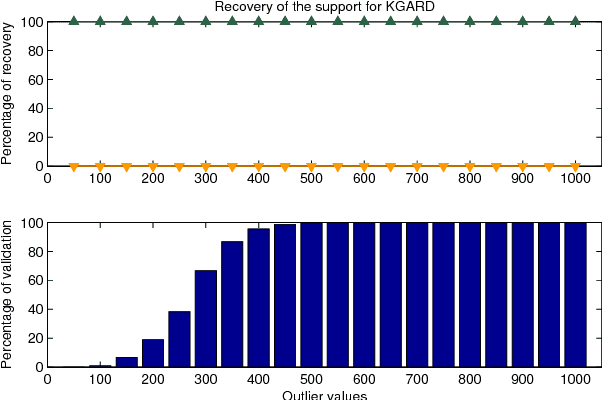
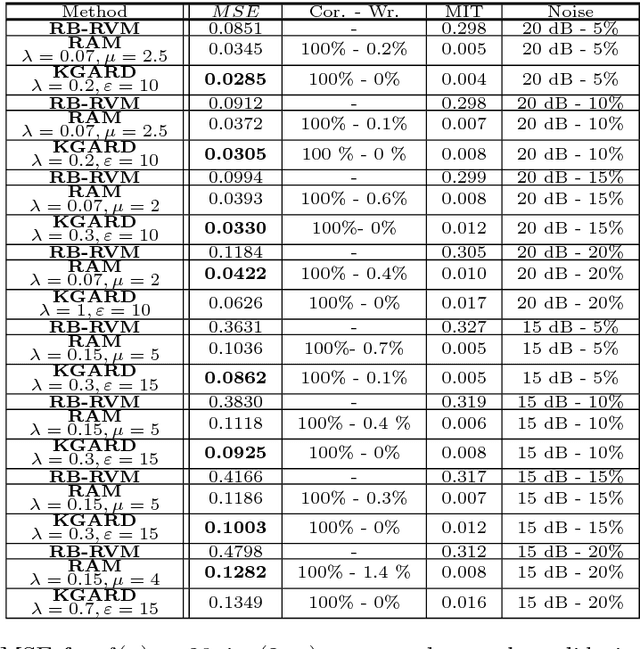
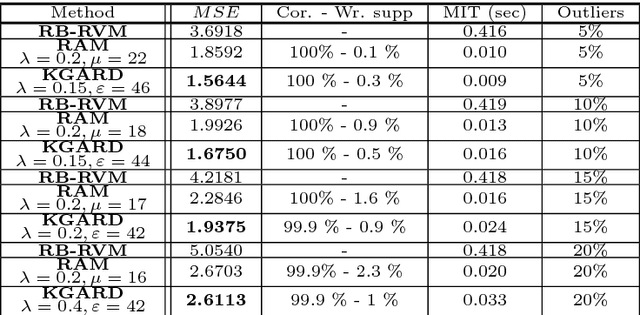
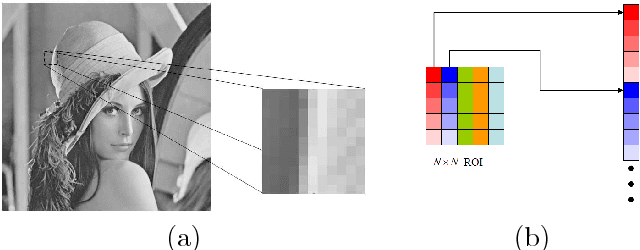
Abstract:We consider the task of robust non-linear regression in the presence of both inlier noise and outliers. Assuming that the unknown non-linear function belongs to a Reproducing Kernel Hilbert Space (RKHS), our goal is to estimate the set of the associated unknown parameters. Due to the presence of outliers, common techniques such as the Kernel Ridge Regression (KRR) or the Support Vector Regression (SVR) turn out to be inadequate. Instead, we employ sparse modeling arguments to explicitly model and estimate the outliers, adopting a greedy approach. The proposed robust scheme, i.e., Kernel Greedy Algorithm for Robust Denoising (KGARD), is inspired by the classical Orthogonal Matching Pursuit (OMP) algorithm. Specifically, the proposed method alternates between a KRR task and an OMP-like selection step. Theoretical results concerning the identification of the outliers are provided. Moreover, KGARD is compared against other cutting edge methods, where its performance is evaluated via a set of experiments with various types of noise. Finally, the proposed robust estimation framework is applied to the task of image denoising, and its enhanced performance in the presence of outliers is demonstrated.
Efficient KLMS and KRLS Algorithms: A Random Fourier Feature Perspective
Jun 12, 2016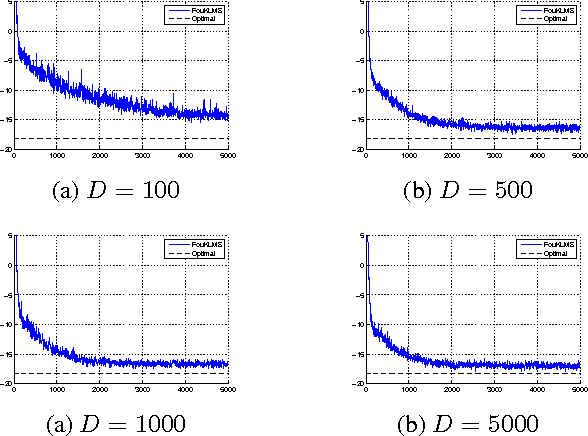
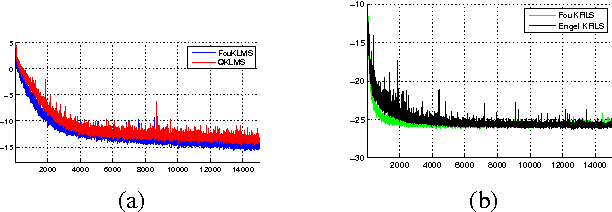

Abstract:We present a new framework for online Least Squares algorithms for nonlinear modeling in RKH spaces (RKHS). Instead of implicitly mapping the data to a RKHS (e.g., kernel trick), we map the data to a finite dimensional Euclidean space, using random features of the kernel's Fourier transform. The advantage is that, the inner product of the mapped data approximates the kernel function. The resulting "linear" algorithm does not require any form of sparsification, since, in contrast to all existing algorithms, the solution's size remains fixed and does not increase with the iteration steps. As a result, the obtained algorithms are computationally significantly more efficient compared to previously derived variants, while, at the same time, they converge at similar speeds and to similar error floors.
Complex Support Vector Machines for Regression and Quaternary Classification
Jul 15, 2014



Abstract:The paper presents a new framework for complex Support Vector Regression as well as Support Vector Machines for quaternary classification. The method exploits the notion of widely linear estimation to model the input-out relation for complex-valued data and considers two cases: a) the complex data are split into their real and imaginary parts and a typical real kernel is employed to map the complex data to a complexified feature space and b) a pure complex kernel is used to directly map the data to the induced complex feature space. The recently developed Wirtinger's calculus on complex reproducing kernel Hilbert spaces (RKHS) is employed in order to compute the Lagrangian and derive the dual optimization problem. As one of our major results, we prove that any complex SVM/SVR task is equivalent with solving two real SVM/SVR tasks exploiting a specific real kernel which is generated by the chosen complex kernel. In particular, the case of pure complex kernels leads to the generation of new kernels, which have not been considered before. In the classification case, the proposed framework inherently splits the complex space into four parts. This leads naturally in solving the four class-task (quaternary classification), instead of the typical two classes of the real SVM. In turn, this rationale can be used in a multiclass problem as a split-class scenario based on four classes, as opposed to the one-versus-all method; this can lead to significant computational savings. Experiments demonstrate the effectiveness of the proposed framework for regression and classification tasks that involve complex data.
The Augmented Complex Kernel LMS
Oct 05, 2011


Abstract:Recently, a unified framework for adaptive kernel based signal processing of complex data was presented by the authors, which, besides offering techniques to map the input data to complex Reproducing Kernel Hilbert Spaces, developed a suitable Wirtinger-like Calculus for general Hilbert Spaces. In this short paper, the extended Wirtinger's calculus is adopted to derive complex kernel-based widely-linear estimation filters. Furthermore, we illuminate several important characteristics of the widely linear filters. We show that, although in many cases the gains from adopting widely linear estimation filters, as alternatives to ordinary linear ones, are rudimentary, for the case of kernel based widely linear filters significant performance improvements can be obtained.
Edge Preserving Image Denoising in Reproducing Kernel Hilbert Spaces
Nov 27, 2010
Abstract:The goal of this paper is the development of a novel approach for the problem of Noise Removal, based on the theory of Reproducing Kernels Hilbert Spaces (RKHS). The problem is cast as an optimization task in a RKHS, by taking advantage of the celebrated semiparametric Representer Theorem. Examples verify that in the presence of gaussian noise the proposed method performs relatively well compared to wavelet based technics and outperforms them significantly in the presence of impulse or mixed noise. A more detailed version of this work has been published in the IEEE Trans. Im. Proc. : P. Bouboulis, K. Slavakis and S. Theodoridis, Adaptive Kernel-based Image Denoising employing Semi-Parametric Regularization, IEEE Transactions on Image Processing, vol 19(6), 2010, 1465 - 1479.
* This work has been selected for the Best Scientific Paper Award (Track III: Signal, Speech, Image and Video Processing) at the ICPR 2010
Extension of Wirtinger's Calculus to Reproducing Kernel Hilbert Spaces and the Complex Kernel LMS
Nov 27, 2010



Abstract:Over the last decade, kernel methods for nonlinear processing have successfully been used in the machine learning community. The primary mathematical tool employed in these methods is the notion of the Reproducing Kernel Hilbert Space. However, so far, the emphasis has been on batch techniques. It is only recently, that online techniques have been considered in the context of adaptive signal processing tasks. Moreover, these efforts have only been focussed on real valued data sequences. To the best of our knowledge, no adaptive kernel-based strategy has been developed, so far, for complex valued signals. Furthermore, although the real reproducing kernels are used in an increasing number of machine learning problems, complex kernels have not, yet, been used, in spite of their potential interest in applications that deal with complex signals, with Communications being a typical example. In this paper, we present a general framework to attack the problem of adaptive filtering of complex signals, using either real reproducing kernels, taking advantage of a technique called \textit{complexification} of real RKHSs, or complex reproducing kernels, highlighting the use of the complex gaussian kernel. In order to derive gradients of operators that need to be defined on the associated complex RKHSs, we employ the powerful tool of Wirtinger's Calculus, which has recently attracted attention in the signal processing community. To this end, in this paper, the notion of Wirtinger's calculus is extended, for the first time, to include complex RKHSs and use it to derive several realizations of the Complex Kernel Least-Mean-Square (CKLMS) algorithm. Experiments verify that the CKLMS offers significant performance improvements over several linear and nonlinear algorithms, when dealing with nonlinearities.
Extension of Wirtinger Calculus in RKH Spaces and the Complex Kernel LMS
May 25, 2010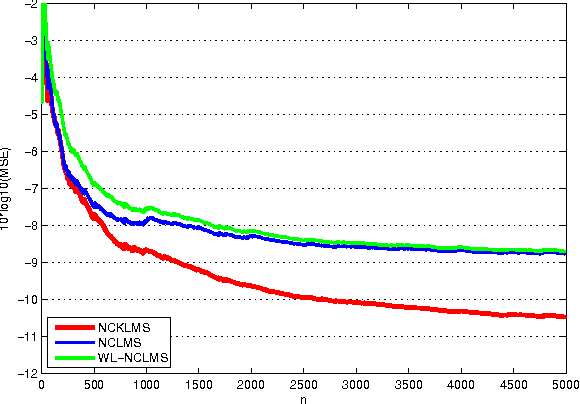
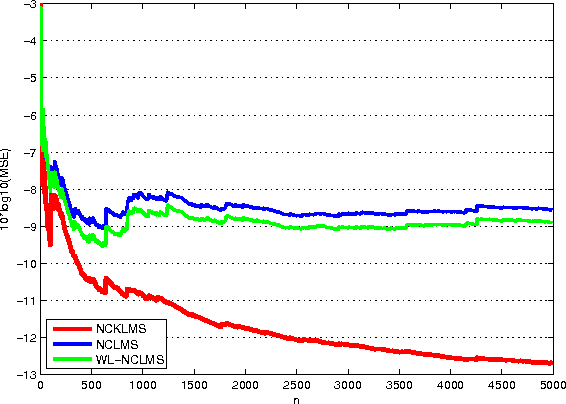
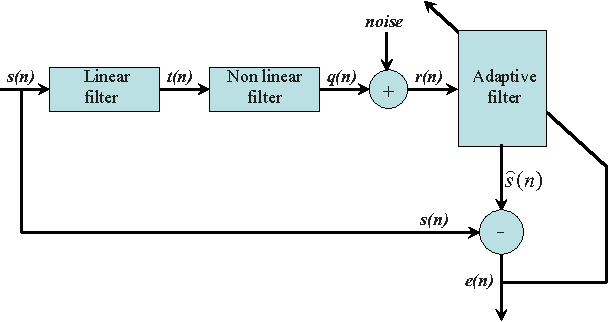
Abstract:Over the last decade, kernel methods for nonlinear processing have successfully been used in the machine learning community. However, so far, the emphasis has been on batch techniques. It is only recently, that online adaptive techniques have been considered in the context of signal processing tasks. To the best of our knowledge, no kernel-based strategy has been developed, so far, that is able to deal with complex valued signals. In this paper, we take advantage of a technique called complexification of real RKHSs to attack this problem. In order to derive gradients and subgradients of operators that need to be defined on the associated complex RKHSs, we employ the powerful tool ofWirtinger's Calculus, which has recently attracted much attention in the signal processing community. Writinger's calculus simplifies computations and offers an elegant tool for treating complex signals. To this end, in this paper, the notion of Writinger's calculus is extended, for the first time, to include complex RKHSs and use it to derive the Complex Kernel Least-Mean-Square (CKLMS) algorithm. Experiments verify that the CKLMS can be used to derive nonlinear stable algorithms, which offer significant performance improvements over the traditional complex LMS orWidely Linear complex LMS (WL-LMS) algorithms, when dealing with nonlinearities.
The Complex Gaussian Kernel LMS algorithm
May 06, 2010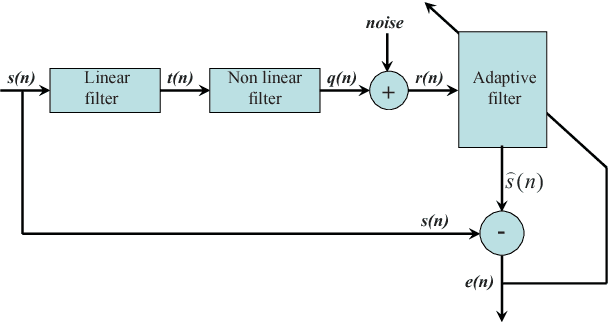
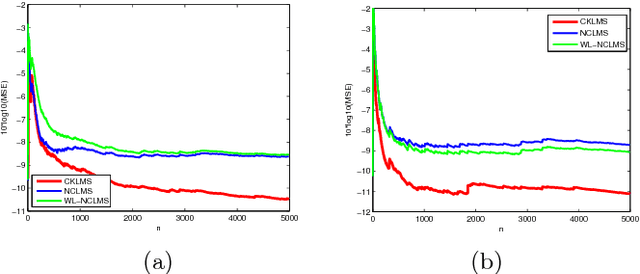
Abstract:Although the real reproducing kernels are used in an increasing number of machine learning problems, complex kernels have not, yet, been used, in spite of their potential interest in applications such as communications. In this work, we focus our attention on the complex gaussian kernel and its possible application in the complex Kernel LMS algorithm. In order to derive the gradients needed to develop the complex kernel LMS (CKLMS), we employ the powerful tool of Wirtinger's Calculus, which has recently attracted much attention in the signal processing community. Writinger's calculus simplifies computations and offers an elegant tool for treating complex signals. To this end, the notion of Writinger's calculus is extended to include complex RKHSs. Experiments verify that the CKLMS offers significant performance improvements over the traditional complex LMS or Widely Linear complex LMS (WL-LMS) algorithms, when dealing with nonlinearities.
 Add to Chrome
Add to Chrome Add to Firefox
Add to Firefox Add to Edge
Add to Edge